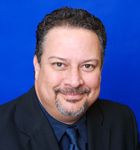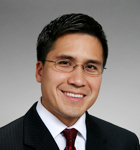As a young and ambitious banking intern, Daniel Ayala met an executive whose job description changed his life. As the banker talked about traveling and doing business around the globe, Ayala knew that this was his dream job. “He really made an impression on me,” he recalls fondly. “He loved his job because he traveled and met a lot of people.”
More than 20 years later, Ayala is thriving in a similar role. So far, he has visited every continent and closed business deals in more than 40 countries. Now as executive vice president and head of Wells Fargo’s global remittance services group, Ayala has excelled in the global banking arena. One of his most successful projects came in 2007 when he helped launch the ExpressSend remittance program, which is used by thousands of immigrants to send money to family and friends to the Caribbean, Asia, Central and South America. “Immigrants are sending close to $200 billion to their families around the world,” he says.
Take Note
Daniel Ayala’s tips for succeeding in the global marketplace
• Observe and absorb the culture.
• Learn the country’s business etiquette. Don’t assume conducting business in other countries will be the same as doing business in the United States.
• Manage your communication style and body language.
• Negotiations are different in other countries. Learn who is the real decision-maker before going into a negotiation meeting. Just ask, who else needs to approve this deal?
Last month, Ayala celebrated another accomplishment. The ExpressSend remittance program doubled its network. It now includes over 5,200 branches for remittances to India, according to Business Wire. “I don’t like a constant environment,” he says. “I like having the opportunity to do business in a global setting and understand how the world operates and makes connections.”
But, those business deals don’t come easy. Ayala travels between one and two weeks each month to Central and South America, Asia, India, and South Africa. Doing business in other countries can be challenging. One of the biggest obstacles Ayala has encountered is knowing whether he is meeting with the ultimate decision-maker or whether he is meeting with what he calls “messengers.” “I had a meeting once and everyone said yes at the meeting, [but] when I showed them the paperwork they said they needed approval,” he says. “Three months later they were still waiting for approval from a supervisor.”
But those challenges are also what keeps the negotiations abroad interesting. “When I go to a country for the first time, I’m like a sponge,” he says with enthusiasm. “I don’t drink Starbucks or read The Wall Street Journal. I’m there to learn. What’s the business etiquette there? I’m there to observe.”
Using this technique, Ayala has learned valuable lessons. For example, in China when you receive a business card you have to receive it with both hands and take a few minutes to admire the person’s credentials. In India, a soft handshake is viewed as a sign of respect and admiration, he explains.
Ayala has learned to adapt to new cultural settings since he was young. He was born in Caracas, Venezuela, but was raised in Bogotá, Colombia. And by the time he was a teenager, he moved to Chicago, where he went to school. He got married when he was 18 years old while attending DePaul University. When he graduated with a degree in computer science, Ayala opened his own consulting firm in Chicago. He specialized in developing accounting software for small business. By 1990, he was working for what is now known as Chase Bank.
During the last 10 years of working for the global remittance services group, Ayala has helped the company grow significantly. The company moved $1.8 billion to Latin America and Asia last year. He started with only one employee and the team has now grown to 70 employees. “I was married with two children. It wasn’t easy to manage both lives,” he says. “I missed birthdays and I wasn’t around for every game. But, I was trying to better myself and be able to provide a better life for them.”
As one of the few minority bank executives, Ayala says he is used to walking into a meeting where he is the only Latino. But, he doesn’t want to be in those meetings alone. He sets time aside to mentor young bankers. “I’m always willing to give them 15 minutes,” he says. “I always have an open-door policy. I’m willing to provide access to those who want it and are willing to wait for it.”
He says it is important to mentor and guide young bankers. “There are three basic principles people are losing sight of,” he says. “Face-to-face networking cannot be replaced with social media and education is extremely important.” The last one is less obvious, but just as important, he says. “If everything else fails, what’s going to keep you together [is to maintain] a connection to where you come from.”
To download the “Best of 2013″ edition on your iPad, visit our iTunes app here.

